Are spinach wraps really as healthy as they seem? Let’s take a closer look at the carb content to find out.
Spinach wraps are a type of tortilla or flatbread that incorporates spinach into the dough. They are often considered a healthier alternative to traditional wraps made with refined flour. Spinach wraps are typically lower in calories and higher in fiber compared to wraps made with refined flour. They are also a good source of iron, vitamins, and minerals. Spinach contains antioxidants that protect cells from damage and has anti-inflammatory properties.
Spinach wraps can accommodate various dietary preferences, including gluten-free, vegetarian, vegan, and dairy-free diets. When choosing a spinach wrap, it is important to consider the filling ingredients to further enhance its nutritional value. Whether homemade or store-bought, spinach wraps can be a flavorful and versatile choice for a healthy and nutritious meal.
Key Takeaways:
- Spinach wraps are a healthier alternative to traditional wraps made with refined flour.
- They are lower in calories and higher in fiber compared to their refined flour counterparts.
- Spinach wraps are a good source of iron, vitamins, and minerals.
- Spinach contains antioxidants that protect cells from damage.
- Spinach wraps can accommodate various dietary preferences, including gluten-free, vegetarian, vegan, and dairy-free diets.
Understanding the Basics of Spinach Wraps
Spinach wraps are a type of tortilla or flatbread that incorporate nutrient-rich spinach into their dough. They are a popular choice for those looking to add a healthier twist to their meals. Spinach wraps offer a delicious and convenient way to enjoy the goodness of spinach while enjoying your favorite fillings.
When it comes to nutrition, spinach wraps are often praised for their lower calorie content compared to traditional wraps made with refined flour. This is because spinach wraps are typically made with whole wheat or whole grain flour, which provides more fiber and essential nutrients. A 10-inch spinach wrap contains approximately 150-200 calories, making it a lighter option for those watching their calorie intake.
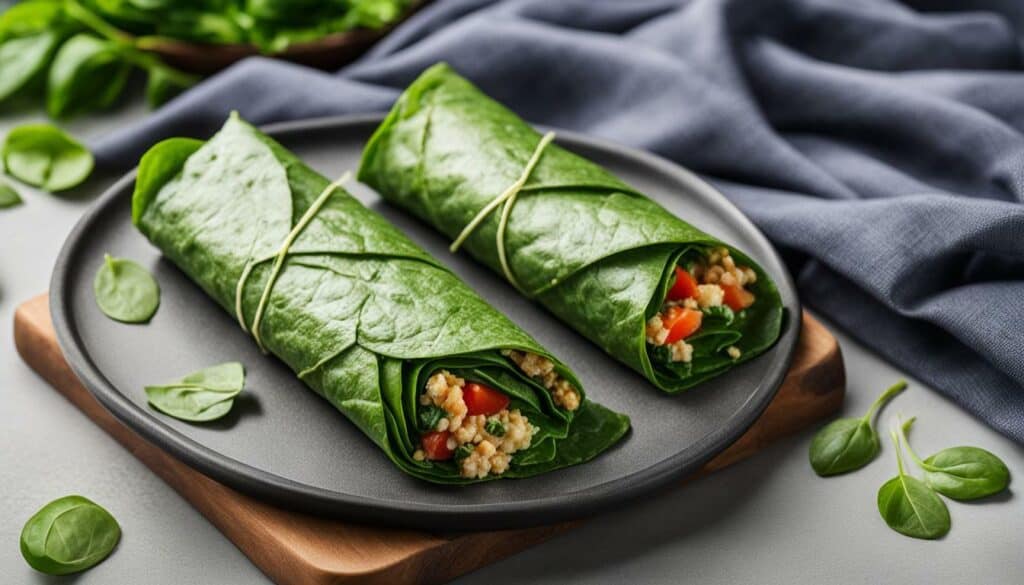
| Nutrient | Amount Per 1 Wrap (10-inch) |
|---|---|
| Calories | 150-200 |
| Carbohydrates | 25-30 grams |
| Fiber | 3-4 grams |
| Protein | 4-5 grams |
| Fat | 2-4 grams |
| Vitamin A | Excellent source |
| Vitamin C | Good source |
| Iron | Good source |
Spinach wraps also provide a good amount of fiber, with approximately 3-4 grams per wrap. This can contribute to a feeling of fullness and aid in digestion. Moreover, spinach wraps contain essential vitamins and minerals, such as vitamin A, vitamin C, and iron. These nutrients are crucial for maintaining overall health and supporting various bodily functions.
So, whether you’re looking for a lighter option in terms of calories or seeking to incorporate more nutrient-dense ingredients into your meals, spinach wraps can be a great choice. They offer a tasty and versatile way to enjoy a variety of fillings while adding a healthy dose of spinach to your diet.
The Low Carb Advantage of Spinach Wraps
If you’re watching your carb intake, spinach wraps may be a great option to consider. These flavorful wraps offer a lower carbohydrate content compared to traditional wraps made with refined flour. By incorporating spinach into the dough, these wraps not only bring a vibrant green hue but also deliver a range of nutritional benefits.
Spinach wraps are typically lower in calories and higher in fiber than their refined flour counterparts. This makes them a satisfying choice that can help support weight management and promote digestive health. Additionally, spinach wraps are a good source of iron, vitamins, and minerals. Iron is essential for carrying oxygen throughout the body, while vitamins and minerals play important roles in maintaining overall health and well-being.
Not only do spinach wraps provide vital nutrients, but they also contain antioxidants that protect cells from damage and have anti-inflammatory properties. Antioxidants help fight against free radicals in the body, reducing the risk of chronic diseases. The anti-inflammatory properties of spinach can contribute to a healthier lifestyle by supporting a balanced immune system and reducing inflammation in the body.
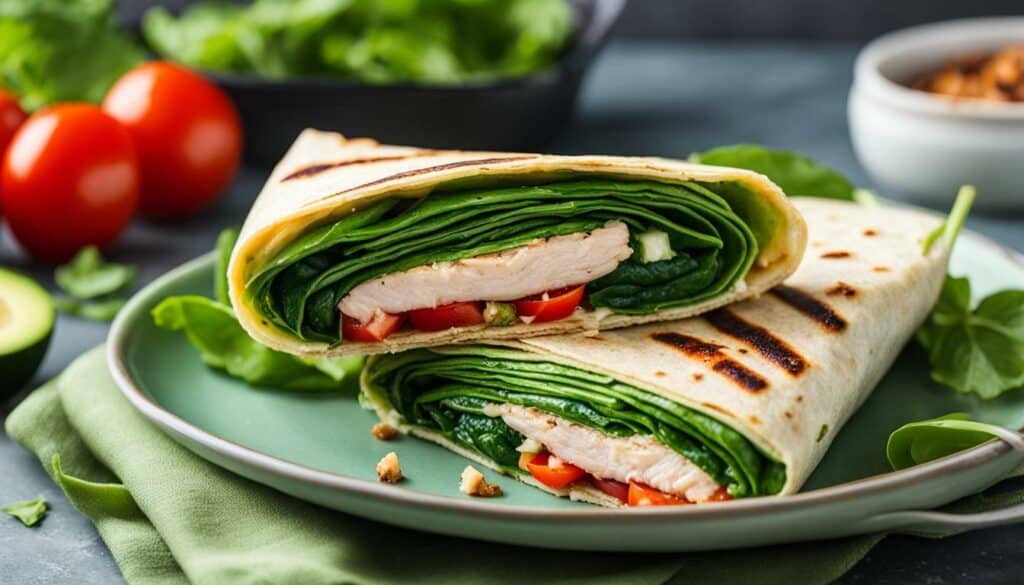
Spinach wraps can also accommodate various dietary preferences, making them a versatile choice for different eating plans. Whether you follow a gluten-free, vegetarian, vegan, or dairy-free diet, spinach wraps can fit seamlessly into your meal options. They provide a great alternative to traditional wraps for those with specific dietary needs.
When choosing a spinach wrap, it’s important to consider the filling ingredients as well. By selecting nutritious fillings such as lean proteins, fresh vegetables, and healthy fats, you can further enhance the nutritional value of your wrap. These combinations can provide a well-rounded and satisfying meal that is both delicious and nutrient-dense.
In summary, spinach wraps offer the low carb advantage while providing a range of nutrients and health benefits. With their lower carbohydrate content, versatility, and nutritional value, spinach wraps can be a great choice for those looking to maintain a balanced diet and make healthier lunch options.
Nutritional Value of Spinach Wraps
Spinach wraps pack a punch when it comes to essential nutrients that support overall health. These green-hued wraps are not only delicious but also offer a range of vitamins, minerals, and other beneficial components.
Spinach, the star ingredient of these wraps, is rich in antioxidants, which help protect our cells from damage caused by harmful free radicals. It also boasts anti-inflammatory properties, making it a valuable addition to a healthy diet.
In addition to these benefits, spinach wraps are a good source of iron, a mineral essential for oxygen transport in our bodies. Iron supports the production of red blood cells and helps prevent iron-deficiency anemia. This is especially important for individuals with an increased demand for iron, such as pregnant women.
| Nutrient | Amount per Serving |
|---|---|
| Calories | 110 |
| Carbohydrates | 24g |
| Fiber | 3g |
| Protein | 4g |
| Fat | 1g |
| Vitamin A | 80% of the Daily Value (DV) |
| Vitamin C | 15% of the DV |
| Iron | 10% of the DV |
When enjoying a spinach wrap, it’s important to consider the filling ingredients as well. Adding lean protein, such as grilled chicken or tofu, can boost the protein content and make the wrap more satisfying. Incorporating a variety of colorful vegetables can further enhance the nutritional value by providing additional vitamins, minerals, and fiber.
Whether you choose to make your own spinach wraps or opt for store-bought versions, the nutritional value remains relatively consistent. Homemade spinach wraps allow for more control over the ingredients used, while store-bought options may offer convenience for those with busy lifestyles.
So next time you’re looking for a healthy and flavorful meal option, consider reaching for a spinach wrap. With their nutritional benefits and versatility, they are sure to satisfy both your taste buds and your body’s need for essential nutrients.
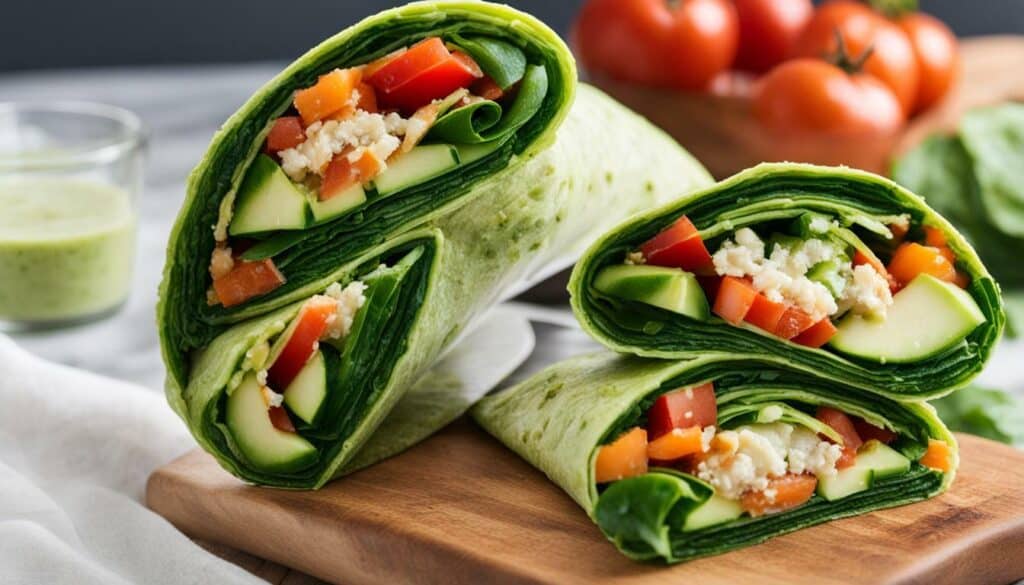
Beyond being a nutrient powerhouse, spinach brings a host of health benefits to your meals. Incorporating spinach into your wraps not only adds vibrant color and fresh flavor but also boosts the nutritional value of your meal. Spinach is packed with antioxidants that protect your cells from damage caused by harmful free radicals. These antioxidants help reduce the risk of chronic diseases such as heart disease and certain types of cancers.
Furthermore, spinach contains anti-inflammatory properties that can help reduce inflammation in the body. Chronic inflammation has been linked to various health issues, including arthritis, diabetes, and obesity. By including spinach in your wraps, you can help combat these inflammatory responses and support overall well-being.
| Nutrient | Amount per 100g |
|---|---|
| Calories | 23 kcal |
| Carbohydrates | 3.6g |
| Protein | 2.9g |
| Fat | 0.4g |
| Fiber | 2.2g |
| Vitamin A | 9377 IU |
| Vitamin C | 28.1mg |
| Iron | 2.7mg |
Not only does spinach provide these health benefits, but it is also low in calories and carbohydrates, making it an ideal ingredient for those watching their carb intake. With only 3.6g of carbs per 100g, spinach wraps can be part of a balanced and healthy diet. They are a great option for individuals who want to enjoy the convenience of a wrap while still prioritizing their health and wellness.
So, the next time you’re looking for a nutritious and delicious lunch option, consider opting for a spinach wrap. Its vibrant green hue and multitude of health benefits make it a winning choice for those who want to nourish their bodies and indulge in flavorsome meals. Remember to get creative with your fillings, adding even more nutritional value to your meal. With spinach wraps, you can have a satisfying and health-conscious lunch that doesn’t compromise on taste.

Disclaimer: The nutritional values provided are approximate and may vary depending on the specific brand and preparation method. Please refer to product labels or consult a registered dietitian for accurate information.
Dietary Considerations with Spinach Wraps
Spinach wraps offer flexibility to meet the dietary needs of different individuals. Whether you follow a gluten-free, vegetarian, vegan, or dairy-free diet, spinach wraps can be a delicious and nutritious option. The incorporation of spinach into the dough adds an extra dose of vitamins and minerals, making these wraps a healthy choice for various dietary preferences.
For those following a gluten-free diet, spinach wraps made with alternative flours, such as almond or chickpea flour, are available. These wraps provide a gluten-free option without compromising on taste or texture. When choosing a gluten-free spinach wrap, it’s essential to check the label for any potential cross-contamination with gluten-containing ingredients during the manufacturing process.
If you adhere to a vegetarian or vegan lifestyle, spinach wraps are a versatile choice. You can fill them with an array of plant-based ingredients such as roasted vegetables, hummus, tofu, or beans. The combination of the spinach wrap’s nutrients and the plant-based fillings ensures a well-rounded meal.
For those with lactose intolerance or following a dairy-free diet, spinach wraps offer a great alternative to traditional wraps made with dairy products. These wraps can be filled with dairy-free ingredients like avocado, dairy-free cheese, or plant-based spreads, providing a flavorful and satisfying meal option.
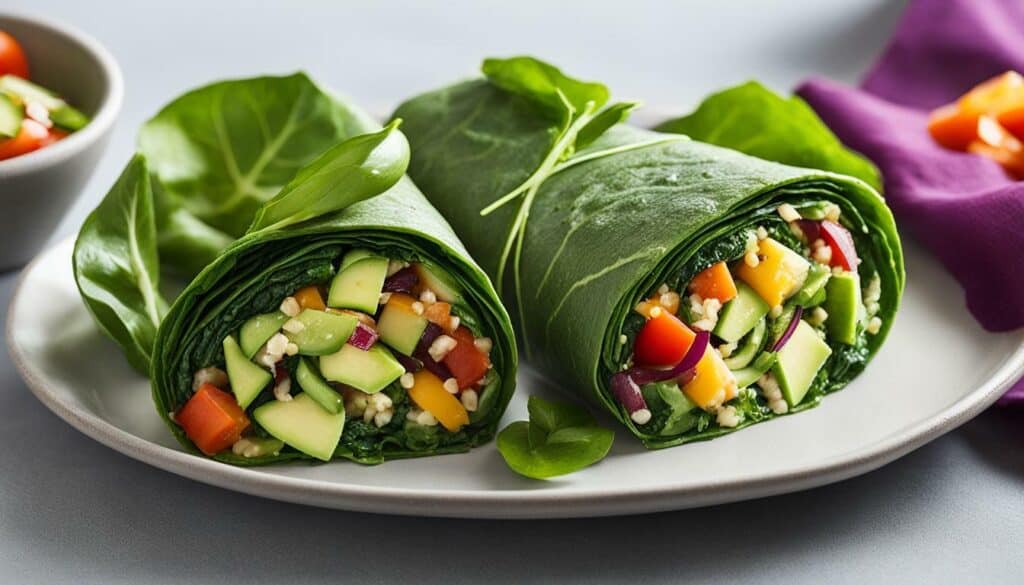
| Dietary Preference | Suitable Ingredients/ Fillings |
|---|---|
| Gluten-Free | Spinach wraps made with alternative flours: almond, chickpea, etc. |
| Vegetarian | Roasted vegetables, hummus, tofu, beans, etc. |
| Vegan | Plant-based proteins: tempeh, seitan, lentils, etc. |
| Dairy-Free | Dairy-free cheese, avocado, plant-based spreads, etc. |
Filling Ingredients and Nutritional Impact
Choosing the right fillings can amplify the health benefits of your spinach wrap. By opting for nutrient-rich ingredients, you can create a delicious and well-rounded meal. Here are some filling options that can boost the nutritional value of your spinach wrap:
- Lean Protein: Add grilled chicken, turkey, tofu, or beans for a protein-packed filling. Protein helps to build and repair tissues and keeps you feeling satisfied.
- Healthy Fats: Avocado slices, hummus, or a drizzle of olive oil can provide heart-healthy fats. These fats are essential for nutrient absorption and help to keep you energized.
- Vegetables: Load up your spinach wrap with a variety of colorful vegetables such as bell peppers, cucumbers, shredded carrots, and cherry tomatoes. These veggies add vitamins, minerals, and fiber to your meal.
- Herbs and Spices: Sprinkle some fresh herbs like basil or cilantro or add a pinch of spices such as cumin or turmeric to enhance the flavor profile of your spinach wrap.
By combining these filling ingredients, you can create a well-balanced spinach wrap that is not only delicious but also nutritious. Keep in mind that portion control is important, especially if you are watching your calorie intake. Enjoying your spinach wrap with a side of mixed greens or a colorful salad can further increase your vegetable intake and add more nutritional value to your meal.
| Nutrient | Amount per Serving (Approx.) |
|---|---|
| Calories | 150-200 |
| Total Fat | 5-10g |
| Carbohydrates | 20-30g |
| Fiber | 3-5g |
| Protein | 8-12g |
| Vitamin A | 50-100% of daily value |
| Vitamin C | 20-40% of daily value |
| Iron | 10-15% of daily value |
These nutritional values are approximate and may vary depending on the specific ingredients and portion sizes used in your spinach wrap. Always refer to product labels or consult a registered dietitian for precise information.
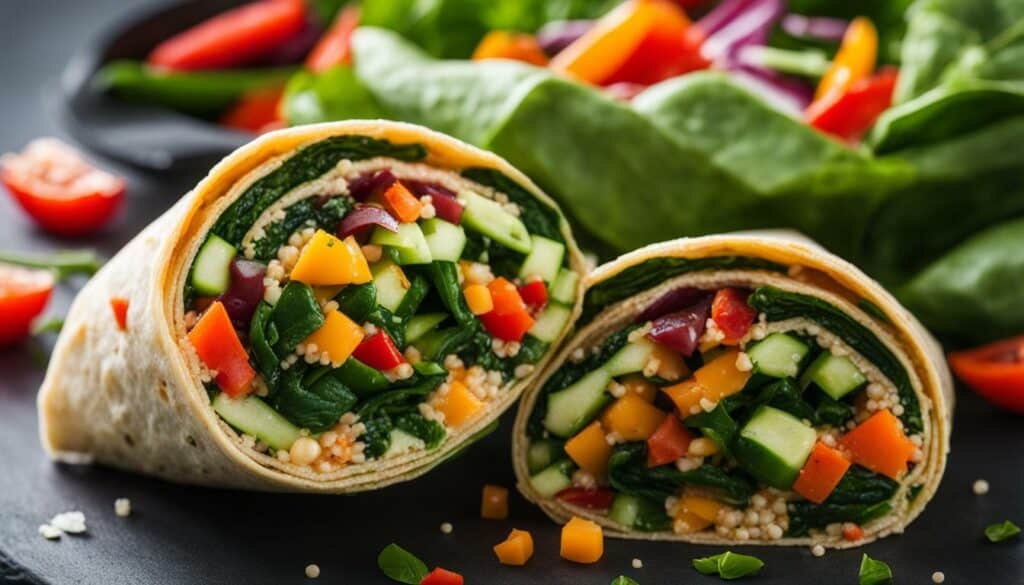
Remember, the key to a healthy spinach wrap is not only the carb content but also the overall nutritional value. By choosing nutrient-dense fillings, you can enjoy a satisfying and nourishing meal that contributes positively to your well-being.
Homemade vs. Store-Bought Spinach Wraps
If you’re looking to manage your carb intake, it’s important to know the differences between homemade and store-bought spinach wraps. While both options offer the health benefits of spinach, there are a few factors to consider when choosing which one to include in your diet.
When making homemade spinach wraps, you have control over the ingredients used, allowing you to customize the recipe to suit your dietary needs. You can opt for whole wheat flour instead of refined flour, which increases the fiber content and reduces the overall carb count. Additionally, you can experiment with different seasonings and flavors, enhancing the taste while keeping an eye on the nutritional value.
Store-bought spinach wraps, on the other hand, offer convenience and time-saving benefits. They are readily available in most grocery stores and can be a quick and easy option for busy individuals. However, it’s important to read the labels carefully as some store-bought wraps may contain added sugars, preservatives, or higher levels of sodium. Be sure to choose brands that prioritize wholesome ingredients and have lower carb counts.
| Homemade Spinach Wraps | Store-Bought Spinach Wraps | |
|---|---|---|
| Carb Content | Varies depending on the recipe | Check the label for specific carb count |
| Customization | You can control the ingredients and flavors | Limited customization options |
| Convenience | Requires time and effort to make | Quick and ready-to-use |
| Nutritional Value | Can be more nutrient-dense with the right ingredients | May contain added sugars or higher sodium levels |
Ultimately, whether you choose homemade or store-bought spinach wraps depends on your lifestyle, dietary preferences, and nutritional goals. If you have the time and enjoy cooking, making your own wraps allows you to have more control over the ingredients used. On the other hand, if you’re looking for a convenient option, store-bought wraps can be a good choice as long as you select brands that prioritize healthier ingredients and have lower carb counts. Whichever option you choose, spinach wraps can be a tasty and nutritious addition to your meals.
Spinach wraps can be your canvas for creating delicious and healthy meals. Whether you are looking for a quick lunch or a light dinner option, spinach wraps offer endless possibilities to satisfy your taste buds. From fresh vegetables to flavorful proteins, you can customize your spinach wrap to suit your preferences and dietary needs.
One versatile way to enjoy spinach wraps is by adding a variety of fillings. You can layer your wrap with sliced veggies like tomatoes, cucumbers, and bell peppers for a refreshing crunch. For protein, you can include grilled chicken or tofu, which adds both texture and substance to your wrap. To enhance the flavor, you can top it off with a dollop of hummus, tzatziki sauce, or a sprinkle of your favorite herbs and spices.
What makes spinach wraps even more appealing is that they can easily accommodate different dietary preferences. If you follow a gluten-free diet, you can find gluten-free spinach wraps or make your own using alternative flours like chickpea or almond flour. For vegetarians and vegans, spinach wraps can be filled with a variety of plant-based proteins such as quinoa, black beans, or falafel. And for those who are lactose intolerant or avoid dairy, you can skip the cheese and opt for dairy-free toppings and sauces instead.
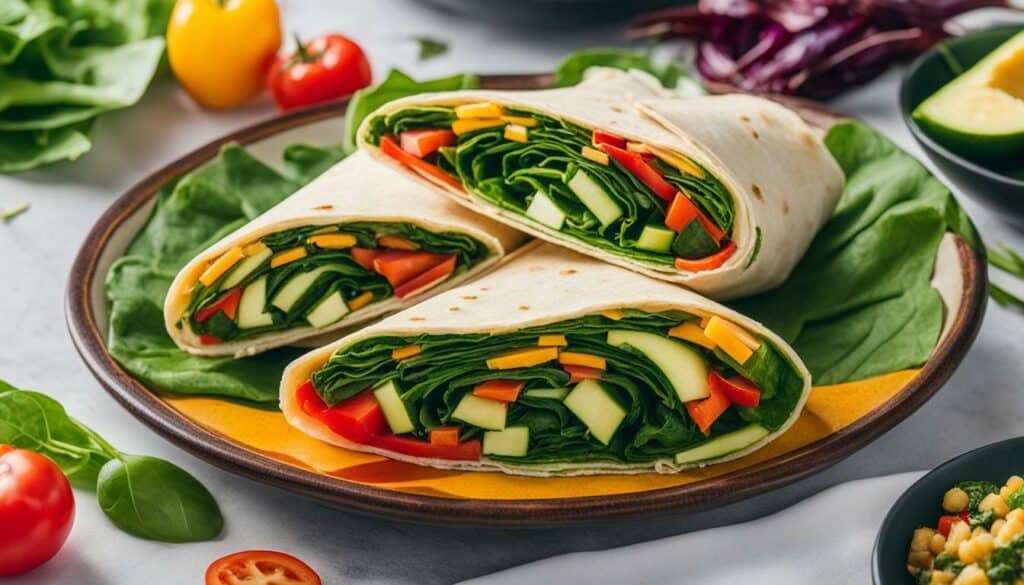
With their vibrant green color and robust flavor, spinach wraps are not only nutritious but also visually appealing. They are packed with fiber, vitamins, and minerals that contribute to a well-rounded meal. Spinach, the star ingredient, is rich in antioxidants that protect your body against cellular damage. It also possesses anti-inflammatory properties, making it a great addition to a healthy diet. By incorporating spinach wraps into your meal rotation, you can indulge in a satisfying and flavorful dish that supports your overall well-being.
So, the next time you’re looking for a quick and nourishing meal option, consider reaching for a spinach wrap. With their versatility and health benefits, they are sure to leave you satisfied and feeling good about your food choices.
Conclusion
By examining the carb content of spinach wraps and considering their nutritional value, we can confidently determine if they are truly a healthy choice for your lunchtime enjoyment.
Spinach wraps offer a range of benefits that make them a favorable option for those seeking a nutritious meal. These wraps incorporate spinach into the dough, providing a boost of essential vitamins, minerals, and antioxidants. Spinach contains valuable nutrients that support overall health and well-being, including iron, which plays a vital role in oxygen transport throughout the body.
In addition to their nutritional value, spinach wraps offer versatility for different dietary needs. They can be enjoyed by individuals following gluten-free, vegetarian, vegan, and dairy-free diets. This makes spinach wraps a convenient and inclusive option for a variety of lifestyles.
Whether you choose to make your own spinach wraps at home or purchase them from a store, it’s important to consider the filling ingredients. Adding nutrient-dense ingredients, such as lean protein, fresh vegetables, and healthy fats, can further enhance the overall nutritional impact of your spinach wrap.
Ultimately, the decision to include spinach wraps in your meal plan depends on your personal dietary goals and preferences. While they are lower in carbs compared to traditional wraps, it’s essential to pay attention to portion sizes and overall calorie intake. By making mindful choices and incorporating spinach wraps into a well-balanced diet, you can enjoy a delicious and nutrient-packed meal.
FAQ
Q: Are spinach wraps a healthy choice?
A: Spinach wraps are often considered a healthier alternative to traditional wraps made with refined flour. They are lower in calories, higher in fiber, and contain essential vitamins and minerals.
Q: What are the nutritional benefits of spinach wraps?
A: Spinach wraps are a good source of iron, vitamins, and minerals. They also contain antioxidants that protect cells from damage and have anti-inflammatory properties.
Q: Do spinach wraps accommodate specific dietary preferences?
A: Yes, spinach wraps can accommodate various dietary preferences, including gluten-free, vegetarian, vegan, and dairy-free diets.
Q: How can I enhance the nutritional value of spinach wraps?
A: To enhance the nutritional value of spinach wraps, choose fillings that are rich in nutrients, such as lean proteins, fresh vegetables, and healthy fats.
Q: Are homemade or store-bought spinach wraps better in terms of carb content?
A: The carb content of spinach wraps can vary depending on whether they are homemade or store-bought. It’s important to check the nutrition labels and choose options that align with your dietary needs.
Q: How can I enjoy spinach wraps in a flavorful and versatile way?
A: Spinach wraps can be enjoyed in a variety of ways. Fill them with your favorite ingredients, such as grilled chicken, avocado, hummus, or roasted vegetables, to create a delicious and nutritious meal.
Are Bread and Butter Pickles High in Calories?
Are bread and butter pickles high in calories? The calories in bread and butter pickles can vary depending on the brand and preparation method. Typically, these pickles are made with cucumbers, sugar, and vinegar, which contributes to their calorie content. However, portion size and frequency of consumption also play a role in determining their impact on your overall calorie intake.

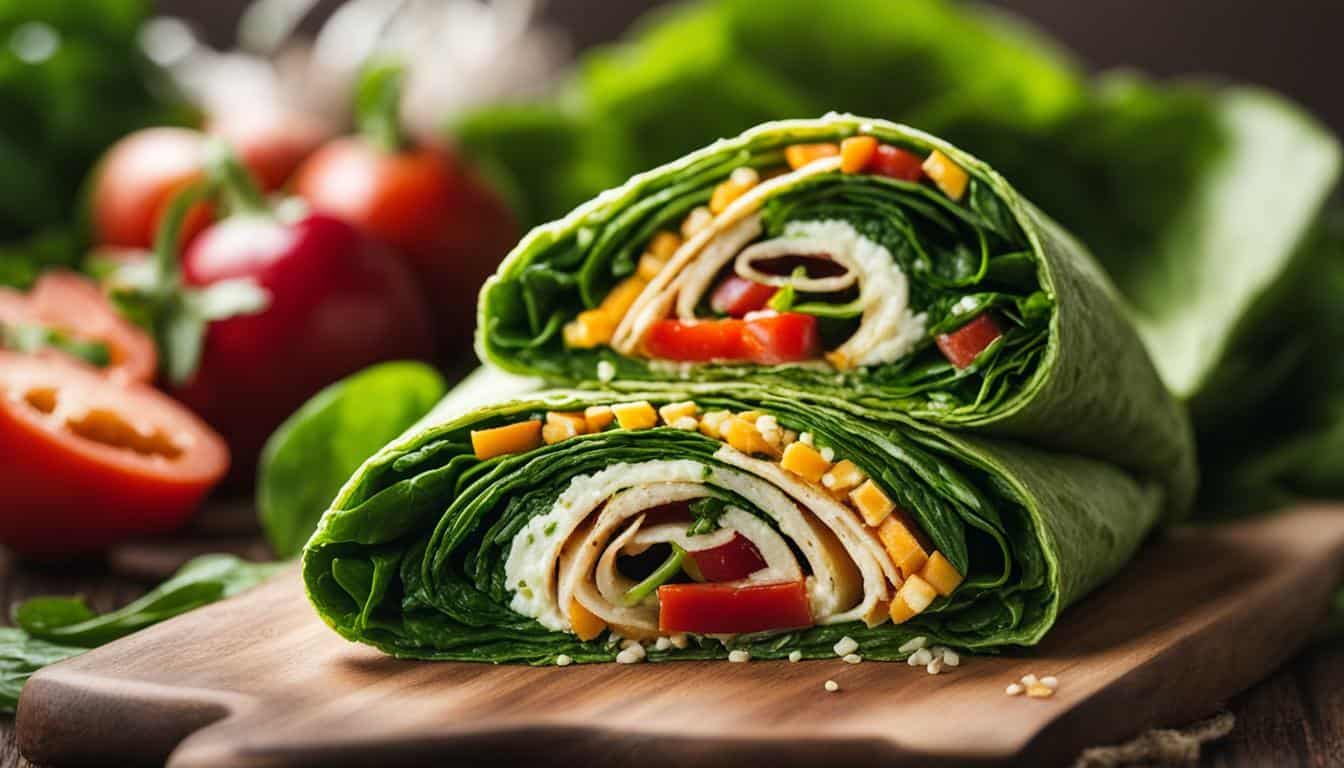



Leave a Reply